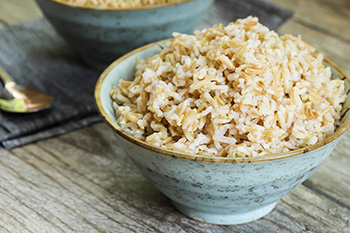More Health and Nutrition Bites
Related
Not So Magic Rice
I was at a medical conference recently and a speaker began talking about "magic rice" as if it were the greatest new food in the world. She went on to explain about research showing that cooking rice with a tablespoon of coconut oil, cooling and refrigerating overnight made it "safe for diabetics."
Whole Grains and Prediabetes
One of the first clinical signs of developing diabetes is what is known as "impaired glucose tolerance." Simply put: after a standard blood glucose test, those who have a blood glucose level that is higher than normal, but lower than that of a person with diabetes, are considered to have impaired glucose tolerance.
Cure Type 2 Diabetes with a Mediterranean-Style Diet
Five years ago I was really pleased to report on a study that confirmed my personal suspicions: that those with Type 2 diabetes need not count carbohydrates or use exchange lists, but need only follow a healthy, Mediterranean-style diet.
Health & Nutrition Bites
Get the latest health and diet news - along with what you can do about it - sent to your Inbox once a week. Get Dr. Gourmet's Health and Nutrition Bites sent to you via email. Sign up now!
'Resistant starch' does not improve glycemic control

Earlier this year I wrote a column debunking the pseudoscience around the so-called "magic rice." This "magic rice" has been purported to be "safe for diabetics:" it supposedly doesn't contribute as much to the spikes in blood sugar associated with consuming carbohydrates as does rice cooked in the usual way.
The problem with the original research most often cited to support this assertion is that it's not only not research in humans - it's not even research in animals. Other research has been done in animals, however, with some studies in rats using the type of resistant starch in today's research showing that this starch decreases body fat, improves cholesterol scores, and improves insulin resistance. Small studies in people who do not have diabetes have shown improved glucose scores and insulin sensitivity.
But the critical issue hasn't been addressed: does consuming resistant starch help those with diabetes or pre-diabetes with their insulin sensitivity and glucose scores? In short, is this resistant starch really "safe" for those at metabolic risk?
As always, the gold standard of research is the randomized, controlled trial. In a study published recently in the American Journal of Clinical Nutrition (2018;108:492-501) we have the results from just that.
The authors recruited 59 men and women with confirmed pre-diabetes to participate in a randomized trial. These men and women averaged 65 years of age and had an average Body Mass Index of 35 (clinically obese).
At the start of the the trial the participants underwent fasting blood glucose tolerance tests, had blood drawn for cholesterol and other scores, spent time in a metabolic chamber, and had their body fat, bone density, and visceral adipose tissue (the fat around their internal organs) measured using dual-energy X-ray absorptiometry. These tests were repeated at the end of the 12-week study.
For the duration of the 12 weeks the participants were provided with a certain amount of resistant starch (type RS2; see my column for details) in pre-measured, powdered form, or an equal number of calories in the form of a type of cornstarch, which was selected due to its digestibility. The participants were directed to consume the powder daily, mixing their (randomly assigned) powder with yogurt and incorporating it into their usual diet in place of some other food with the same number of calories. Other than the starch powders, the participants were instructed to continue with their usual diet and exercise routine.
After 12 weeks the tests, including glucose tolerance, cholesterol scores, and body fat measurements, were repeated using the same processes as at the start of the study. And the results? Once again emphasize that humans are not rats: as the authors say themselves, supplementing pre-diabetic persons' usual diet with resistant starch "did not improve glycemic control, cardiovascular disease risk factors, ectopic fat, or energy metabolism."
I will grant you that the aforementioned "magic rice" might be considered an RS1 type of resistant starch as opposed to an RS2 (the type tested for this article). Yet there still are no studies establishing that rice cooked with coconut oil (or whichever way is touted this week) actually results in clinically measurably resistant starch that behaves in a certain way in humans. Worse yet, for clinically relevant research one must define how one would create such a rice: using what type of coconut oil? and the coconut oil made by whom? Cooked how?
What this means for you
Aside from showing that at least one type of resistant starch has no effect on markers of metabolic risk, the authors of today's research provide us with two distinct lessons. The first lesson is that humans are not animals and we can't assume that what is true for animal models will be true for humans. The second lesson is that it is critical to define your intervention: coconut oil? olive oil? rice left in the refrigerator overnight (my personal favorite "type" of resistant starch)?
Calling something "resistant starch" and claiming positive effects (let alone the miraculous effects of magic rice) has little scientific meaning if you can't define "resistant starch."
First posted: September 19, 2018
